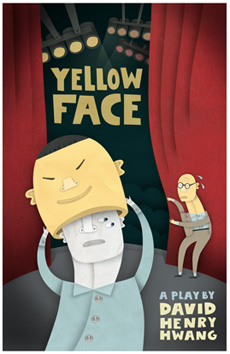
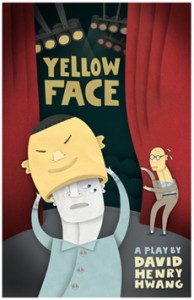 Highly Recommended How do we define who we are? That is an important part of what Tony Award winner David Henry Hwang brings to his almost auto biographical play “Yellow face” now on stage at Silk Road Theatre Projects intimate theater located downstairs in The Historic Chicago Temple Building, just down the street fro The Goodman Where “Chinglish” is in preparation for its move to Broadway. Under the skilled hand of director Steve Scott on a simple three sided set by Tom Burch, Hwang take us on a trip through his world and his own struggle to define racial identity in today’s world. Here is a man who protested strongly the use of non-Asians playing Asians in movies and even on stage ( “Miss Saigon” truly began his revolution) and yet, in one of his own plays, in error, he hired a Caucasian actor ( who he thought to be at least part Asian) to portray the lead. The play did not do well, but this artificial Asian ( Marvelously played by Clayton Stamper), Marcus Ghee, went on to continue to “be Asian” and fight for their causes and play the King in the “King and I” to marvelous reviews. Hwang ( in this play named DHH , played to perfection by David Rhee) in order to not have people think he did not believe in his own cause, made Ghee “Asian” and yet was displeased by his success.
Highly Recommended How do we define who we are? That is an important part of what Tony Award winner David Henry Hwang brings to his almost auto biographical play “Yellow face” now on stage at Silk Road Theatre Projects intimate theater located downstairs in The Historic Chicago Temple Building, just down the street fro The Goodman Where “Chinglish” is in preparation for its move to Broadway. Under the skilled hand of director Steve Scott on a simple three sided set by Tom Burch, Hwang take us on a trip through his world and his own struggle to define racial identity in today’s world. Here is a man who protested strongly the use of non-Asians playing Asians in movies and even on stage ( “Miss Saigon” truly began his revolution) and yet, in one of his own plays, in error, he hired a Caucasian actor ( who he thought to be at least part Asian) to portray the lead. The play did not do well, but this artificial Asian ( Marvelously played by Clayton Stamper), Marcus Ghee, went on to continue to “be Asian” and fight for their causes and play the King in the “King and I” to marvelous reviews. Hwang ( in this play named DHH , played to perfection by David Rhee) in order to not have people think he did not believe in his own cause, made Ghee “Asian” and yet was displeased by his success.
In this story which deals with Identity, in particular that of the Asian community who for many years were not properly represented on stage or film and Hwang’s fight to give them “face”! “You are what you believe you are” is of great importance as a White actor, who is believed to be Asian finds himself , in his mind, feeling the need to take on the cause of the Asians. As time goes on, he truly becomes, in his mind and his spirit a leader of this group and although Hwang got him to this point, he is upset over the non-Asian taking credit for the things that are taking place. The term “Yellow Face” refers to the mask that White actors don over the years to portray Asian characters, while Asian actors play roles as houseboys, waiters etc, never getting their just desserts. In this play, Hwang says “Face” is what we choose to show the world- “that is who we truly are!”.
This is a tight play that must have been hard to put down on paper as much if it is a personal part of Hwang’s own story. Hwang is an American, but he is a Asian American and to many there is a difference. In this story, his father ( a marvelous character played by the always strong Joseph Anthony Foronda) came to America to become an American and build a better life. He does, but as it turns out is being investigated over some money transfers from China that may not be “kosher” and his son has been placed on the board and all hell breaks looses. The other cast members that make this production one that should be on your “to see list” are Lydia Berger,Tanya McBride,Christopher Meister and Christopher Popio who take on many roles as this story unfolds.
Hwangcertainly has a great sense of comic touch in his writing, but beneath the laughter, there is also truth- truth about who he is and his own struggle to become who he is and the plight of many others who are just starting to get their due. Think back in time to some of the big movies that had White Americans playing characters like Charlie Chan and even on Tv when David Carradine was given the role of Caine in the series “Kung Fu”. “Yellow Face” will continue through July 31st with perofrmances as follows:
*Tuesday,Wednesday and Thursdays at 7:30 p.m.,Fridays at 8 p.m., Saturdays at 4 and 8 p.m. and Sundays at 4 p.m.
Tickets are $34 and can be purchased at the Goodman Theatre Box Office ( 170 N. Dearborn Street), by phone at 312-443-3800 or online at www.srtp.org
* Only on July 14th
If you drive, park at LOOP{ Parking located at 230 W. Washington for $6 ( validation required)
The theater is located in the beautiful, historical Chicago Temple Building
77 West Washington ( at Clark) in Pierce Hall ( lower level)

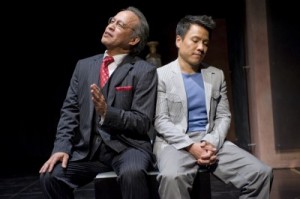


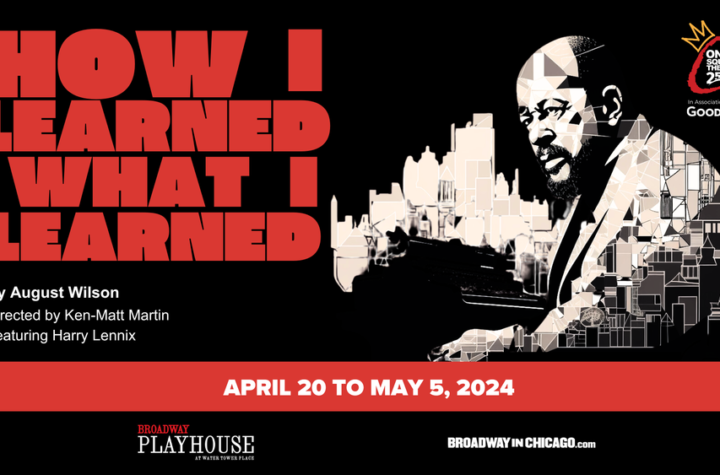
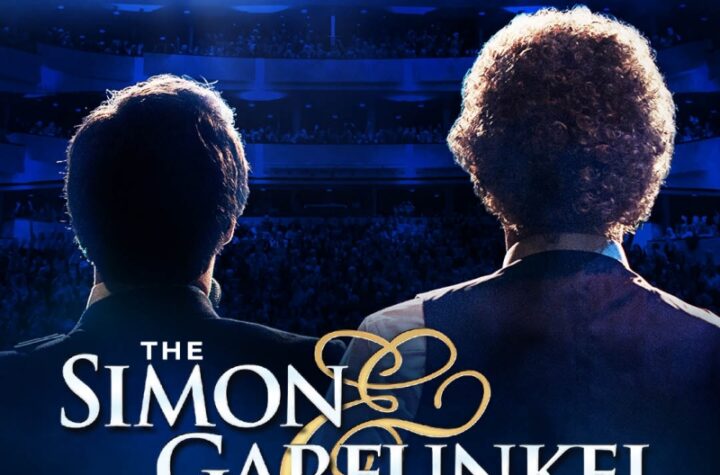
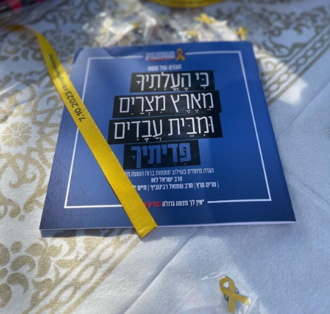
More Stories
“Joe Turner’s Come and Gone”
“How I Learned What I Learned” reviewed by Julia W. Rath
“How to Know the Wild Flowers: A Map” reviewed by Julia W. Rath